Newsletter : Perspectives from International Talents at Yamaha Motor Headquarters in Japan --Creating an Energized and Cosmopolitan Workplace Where Individual Talents Can Shine--
April 25, 2024
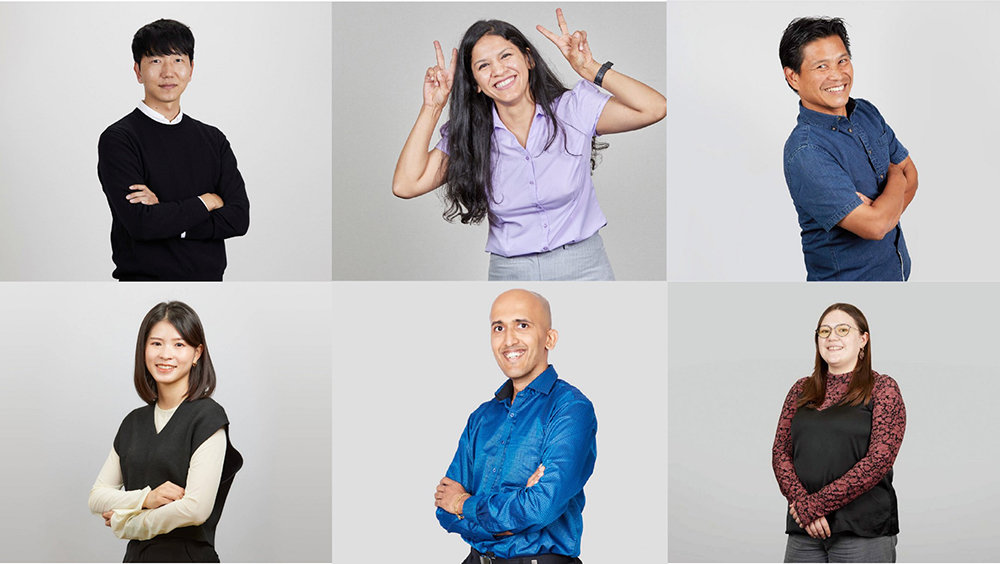
It has been about 10 years since Yamaha Motor's headquarters in Japan began developing personnel systems and other measures for hiring non-Japanese employees. Over that time, the number of such employees has continued to increase annually, and today, international hires can be found working in various departments throughout the company, from development and marketing to corporate sections. For this issue, we interviewed some of these personnel from abroad to hear their honest thoughts and opinions on living and working in Japan, the differences in culture and values they feel working at Yamaha Motor, and more.
■A Desire to Bridge Cultural Gaps
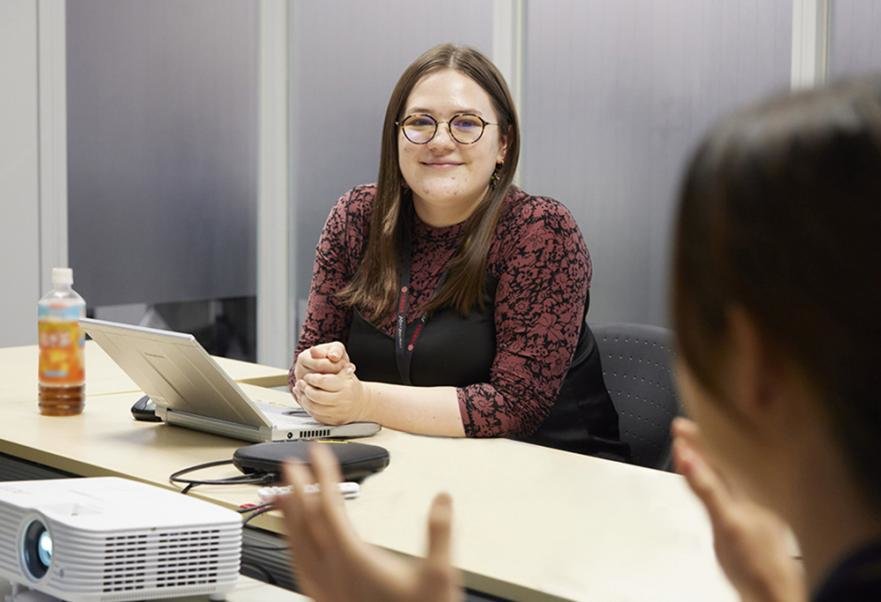
Rachael Hurren hails from the UK and is a popular figure in her workplace. After work hours, she regularly provides English conversation lessons to her colleagues.
Every Tuesday, English native Rachael Hurren gathers 10 of her workplace colleagues together for an English conversation class. "After work is over, I put together materials using content from English marketing websites and teach useful expressions for business settings. I originally started doing this after getting requests for a study group, but I'm delighted to contribute to improving everyone's English skills."
Hurren works in overseas sales for Yamaha Motor's genuine parts and accessories business and admits that it is not easy for foreigners to understand Japanese culture. She also notes that in her interactions with those in the markets she is responsible for, mix-ups arise due to both sides not fully understanding the other's culture and views, but Hurren hopes to bridge such differences. "The Japanese business style has a very complex approval process and it sometimes takes a long time for something to be approved," she says. "But I'm sure it can be simplified and made more efficient. On the other hand, I think things like regular job rotations encourage the growth of each employee and are an advantage with Japanese companies."
On another front, Deepika Rana from India was assigned to the Mobility Service Business (MSB) Division. She was drawn to work at Yamaha Motor by the department's business vision of creating jobs, improving traffic environments, and contributing to emerging market development through mobility services.
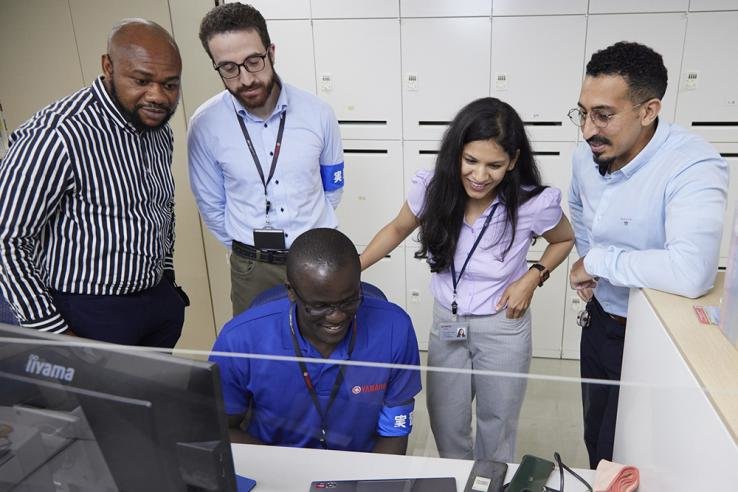
Hurren works in overseas sales for Yamaha Motor's genuine parts and accessories business and admits that it is not easy for foreigners to understand Japanese culture. She also notes that in her interactions with those in the markets she is responsible for, mix-ups arise due to both sides not fully understanding the other's culture and views, but Hurren hopes to bridge such differences. "The Japanese business style has a very complex approval process and it sometimes takes a long time for something to be approved," she says. "But I'm sure it can be simplified and made more efficient. On the other hand, I think things like regular job rotations encourage the growth of each employee and are an advantage with Japanese companies."
On another front, Deepika Rana from India was assigned to the Mobility Service Business (MSB) Division. She was drawn to work at Yamaha Motor by the department's business vision of creating jobs, improving traffic environments, and contributing to emerging market development through mobility services.

"I love the free and welcoming feel of this workplace," states Deepika Rana, one of the many international hires with the MSB Division.
"Our department has many non-Japanese employees, so diversity is deeply rooted here. I love the cosmopolitan, free, and friendly atmosphere of this workplace," she explains. Rana also mentions that there are no walls between teams and equal opportunities for everyone to gain new skills and experience, such as how she recently started studying IT and data analysis despite having a background in finance.
■Building More Programs and Facilities for International Hires
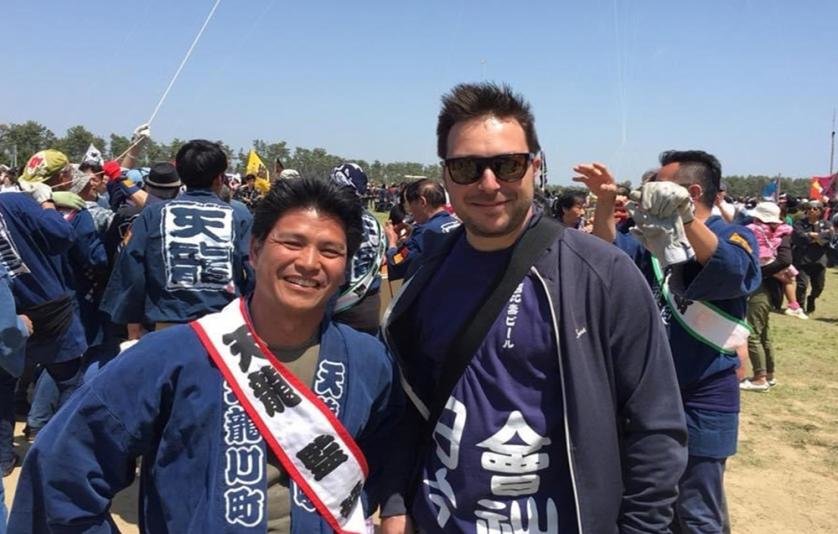
Nor Azhar (left) enjoys flying large-sized traditional kites with the local community at the annual Hamamatsu Festival, one of the area's biggest and most popular events.
Nor Azhar Mostafa from Malaysia joined Yamaha Motor 17 years ago in 2007. "Back then, there wasn't a hiring system in place for workers from overseas," he explains. "So I initially joined as a contracted employee and was given a permanent position six years later." Comparing how things were then to today, Nor Azhar notes how the number of non-Japanese employees at the headquarters has risen significantly. "I feel that the care and facilities for international hires have grown and improved every year, such as prayer rooms or special meal accommodations. It's become easier to work here for me personally as well."
When asked about what surprised him while living in Japan, he enthusiastically shared his answer: "No matter how niche a field may be, there are always individuals here who possess extensive knowledge and experience in it. They're called otaku and there are actually quite a few of them at this company too. Even if the company were to face some kind of crisis, I'm certain our otaku would come up with something and start selling it! That's why Yamaha will live on. I can feel that strength."
■Building More Programs and Facilities for International Hires

Nor Azhar (left) enjoys flying large-sized traditional kites with the local community at the annual Hamamatsu Festival, one of the area's biggest and most popular events.
Nor Azhar Mostafa from Malaysia joined Yamaha Motor 17 years ago in 2007. "Back then, there wasn't a hiring system in place for workers from overseas," he explains. "So I initially joined as a contracted employee and was given a permanent position six years later." Comparing how things were then to today, Nor Azhar notes how the number of non-Japanese employees at the headquarters has risen significantly. "I feel that the care and facilities for international hires have grown and improved every year, such as prayer rooms or special meal accommodations. It's become easier to work here for me personally as well."
While Nor Azhar is a skilled developer of CAE tools, he availed himself of an internal personnel transfer program to gain experience starting new businesses with a team in a different department. He keeps busy in his free time as well, participating in local festivals and more, leading some to say he's "more Japanese than the Japanese."
Abhiram Anand Railkar is an engineer from India with a dream to develop small-scale mobility solutions from scratch, and just thinking about it gets him excited. He is well aware that he is a straight-shooter: "Compared to India, I feel in Japan people tend to not express their opinions clearly. One time, my opinion was misunderstood as rejecting one of my colleagues as a person, so since then, I've worked to find other ways to better express myself. It took time to be able to do this and I struggled at first."
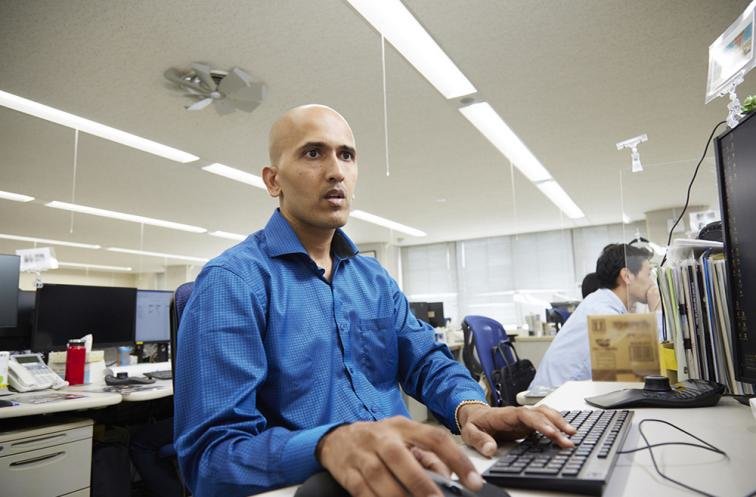 Abhiram expresses his desire to create small-scale mobility solutions from scratch someday.
Abhiram expresses his desire to create small-scale mobility solutions from scratch someday.
Abhiram Anand Railkar is an engineer from India with a dream to develop small-scale mobility solutions from scratch, and just thinking about it gets him excited. He is well aware that he is a straight-shooter: "Compared to India, I feel in Japan people tend to not express their opinions clearly. One time, my opinion was misunderstood as rejecting one of my colleagues as a person, so since then, I've worked to find other ways to better express myself. It took time to be able to do this and I struggled at first."

When asked about what surprised him while living in Japan, he enthusiastically shared his answer: "No matter how niche a field may be, there are always individuals here who possess extensive knowledge and experience in it. They're called otaku and there are actually quite a few of them at this company too. Even if the company were to face some kind of crisis, I'm certain our otaku would come up with something and start selling it! That's why Yamaha will live on. I can feel that strength."
Message from the Editor
To better cater to our employees from overseas, in addition to the prayer rooms mentioned in this issue, the menus in the company cafeteria now include pictograms of pigs and cows for our Muslim and Hindu employees to easily identify the types of meat used in a dish. I believe concrete preparations and measures like these are undoubtedly necessary for accommodating such employees. After listening to the HR division's explanations for this issue, I also feel that we need to increase the number of employees we have from other countries.
According to the HR Strategy Division, global recruitment officially started in 2012, and after over a decade, the number of international hires each year has been growing. However, they still remain a minority compared to the total number of employees we have here. I believe that having more employees from other countries at the headquarters will lead to an easier atmosphere for voicing their concerns regarding any discomfort they may have being in a foreign working environment and thus facilitate the creation of a more comfortable and productive workplace for everyone.
In Japan, the aging population and low birth rates have made labor shortages a growing concern. The Japan International Cooperation Agency (JICA) estimates that the government will face a foreign labor shortage of 630,000 people by 2030. With the hiring of foreign talent expected to become even more challenging, Yamaha Motor needs to become a company more people from overseas will choose to work at. By listening to our current international talents, I hope to see the company quickly build workplaces that are comfortable and enjoyable to be a part of for people of every nationality.
TOKUTOME, Yayoi
■Contact us from the Press
Corporate Communication Division, PR group
Headquarters : +81-538-32-1145
Tokyo Office : +81-3-5220-7211
■News Center: https://global.yamaha-motor.com/news/
According to the HR Strategy Division, global recruitment officially started in 2012, and after over a decade, the number of international hires each year has been growing. However, they still remain a minority compared to the total number of employees we have here. I believe that having more employees from other countries at the headquarters will lead to an easier atmosphere for voicing their concerns regarding any discomfort they may have being in a foreign working environment and thus facilitate the creation of a more comfortable and productive workplace for everyone.
In Japan, the aging population and low birth rates have made labor shortages a growing concern. The Japan International Cooperation Agency (JICA) estimates that the government will face a foreign labor shortage of 630,000 people by 2030. With the hiring of foreign talent expected to become even more challenging, Yamaha Motor needs to become a company more people from overseas will choose to work at. By listening to our current international talents, I hope to see the company quickly build workplaces that are comfortable and enjoyable to be a part of for people of every nationality.
TOKUTOME, Yayoi
■Contact us from the Press
Corporate Communication Division, PR group
Headquarters : +81-538-32-1145
Tokyo Office : +81-3-5220-7211
■News Center: https://global.yamaha-motor.com/news/
